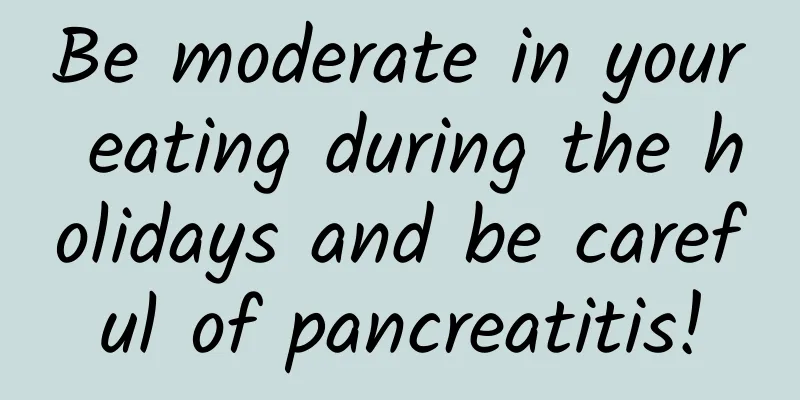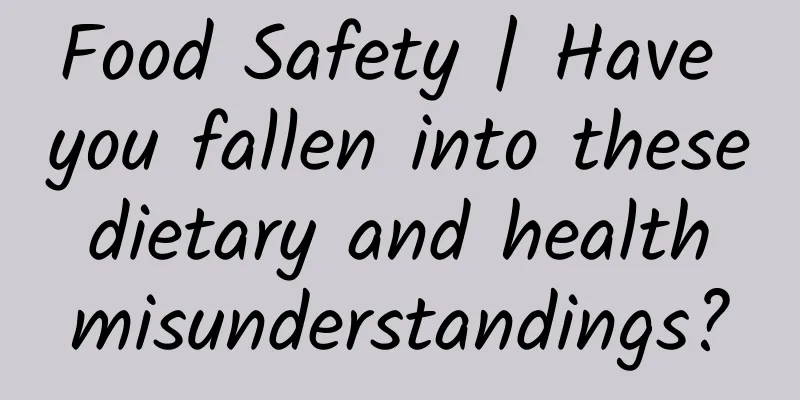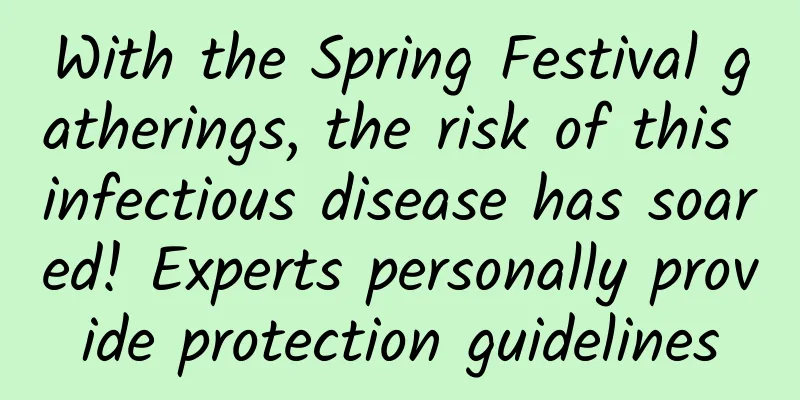Be moderate in your eating during the holidays and be careful of pancreatitis!

|
The Spring Festival holiday is coming, and family and friends gathering to feast are all must-do activities during the holiday. But do you know? If you eat without restraint, overeat, and drink too much, this will make your body "alarm" and easily induce acute pancreatitis. The holiday has just begun, and the number of patients with pancreatitis in the gastroenterology department has increased. Next, let's learn about the relevant knowledge of pancreatitis. 1. What is acute pancreatitis? Acute pancreatitis is an inflammatory reaction caused by the activation of pancreatic enzymes in the pancreas due to various causes, which leads to autodigestion, edema, bleeding and even necrosis of pancreatic tissue. Clinically, it is characterized by acute upper abdominal pain, nausea, vomiting, fever and increased blood amylase and lipase. Depending on the severity of the disease, pancreatitis can be mild, moderate or severe. 2. What are the causes of acute pancreatitis? There are many causes of acute pancreatitis, among which the more common causes are cholelithiasis, alcohol and hyperlipidemia. 1. Gallbladder stones and bile duct stones The common bile duct and pancreas enter the intestine through a common opening. Inflammation or stones in the bile duct can reflux into the pancreas through the common channel. Or when this channel is blocked by stones in the bile duct, the pressure can be transmitted to the pancreatic duct, which can easily induce pancreatitis. 2. High triglycerides When the triglyceride concentration in the body is higher than 1000mg/dL, it may lead to the onset of acute pancreatitis. In recent years, due to the continuous improvement of people's living standards and the unreasonable diet of some people, the incidence of hyperlipidemia has increased significantly, and the number of patients with severe acute pancreatitis and hyperlipidemia has increased. 3. Drinking a lot and overeating Under normal circumstances, the pancreatic juice secreted by the pancreas only digests the food we eat, but overeating will cause excessive secretion of pancreatic juice, activating the digestive enzymes in the pancreatic juice, which will then accumulate in the tiny pancreatic duct and be difficult to discharge, increasing the pressure in the pancreatic duct and causing it to rupture, inducing acute pancreatitis. When alcohol enters the human body, it will directly damage pancreatic cells, causing the pancreas to self-digest and induce pancreatitis. 4. Other reasons These include severe trauma, iatrogenic factors (such as endoscopic retrograde pancreaticocholangiopancreatography), autoimmune diseases, genetic diseases, infections, malignancies, exposure to toxic substances, and certain drugs (such as thiazides, antiretroviral drugs, and valproic acid). 4. Symptoms of acute pancreatitis Common symptoms of acute pancreatitis include: 1. Abdominal pain: Acute onset of persistent severe upper abdominal pain, often radiating to the back. Leaning forward or curling up can relieve the pain, while lying flat will aggravate the pain. 2. Abdominal distension can manifest as partial or full abdominal distension. It occurs simultaneously with abdominal pain and is generally more severe. 3. Nausea and vomiting occur frequently in early stage patients. The vomitus is often gastric contents, bile or coffee-like liquid, and the abdominal pain does not ease after vomiting. 4. Fever is generally around 38 degrees Celsius. It lasts for 3-5 days. If it does not subside for more than a week, secondary infection should be considered. When pancreatic necrosis is accompanied by infection, the patient may have a high fever, often exceeding 39 degrees Celsius. 5. Jaundice is manifested by the sclera, mucous membranes, skin and other tissues being stained yellow, and the degree is generally mild. 6. Subcutaneous hemorrhage: Large purple bruises appear on the skin of the waist, upper abdomen and lower abdomen. Therefore, if suspected symptoms of acute pancreatitis appear, you must go to the hospital in time to avoid worsening of the disease. 5. How to prevent acute pancreatitis? 1. Treat primary diseases. Actively treat primary diseases such as gallstones, biliary tract infection and hyperlipidemia. Patients with hyperlipidemia should regulate cholesterol and triglycerides under the guidance of a doctor to keep blood lipids at a low level. 2. Control your weight and exercise more. Obese people should lose weight appropriately. Under the premise of physical tolerance, choose a suitable exercise method and maintain good exercise habits. 3. Eat a healthy diet. When friends and family gather together during holidays, we should also maintain good eating habits, eat three meals a day regularly, avoid overeating, and avoid consuming a large amount of oily food at one time. People who drink alcohol regularly suffer from damage to organs such as the liver and pancreas due to chronic alcohol poisoning and malnutrition, and their ability to resist infection decreases. Therefore, not drinking excessively is also one of the prevention methods. Finally, I would like to remind everyone that as the holidays are approaching, we should still eat a healthy diet, protect our pancreas, and enjoy a wonderful holiday. |
<<: Stress and the GI tract: How to protect your digestive system in a fast-paced life
Recommend
Can I cross my legs when I'm pregnant?
Some people have the habit of crossing their legs...
Reasons for delaying your period by three days
Menstruation is the popular name for women's ...
How long will it take for a pregnant woman to give birth if she has thigh pain?
Thigh pain in pregnant women is a common phenomen...
Why do women have frequent urination and abdominal distension?
Frequent urination is very common. When you exper...
What are the precautions during pregnancy
For most pregnant women, they are actually new mo...
How big is the egg released?
Many people are more concerned about the fertiliz...
Will the ovulation test paper show a positive result if you are pregnant?
In the early stages of pregnancy, women's bod...
Normal belly picture of 100 days of pregnancy
Pregnancy can be divided into three stages. The p...
Causes of postpartum ovulatory bleeding
Many women experience postpartum ovulation bleedi...
Why are my nipples hard and a little painful?
In addition to showing a sexy side, people probab...
Can I still have a baby after having half of my uterus removed?
In daily life, we often see patients whose cervix...
How to remove pregnancy spots on the face during pregnancy
Many women will have pregnancy spots on their fac...
What should I do if I have lumps in my breasts during lactation? Simple and effective method
Women may also experience lumps in their breasts ...
How to reduce breast size quickly
Don’t think that only men’s chests grow fat. In f...
How long do egg cells survive?
Girls ovulate regularly once a month, and the egg...









